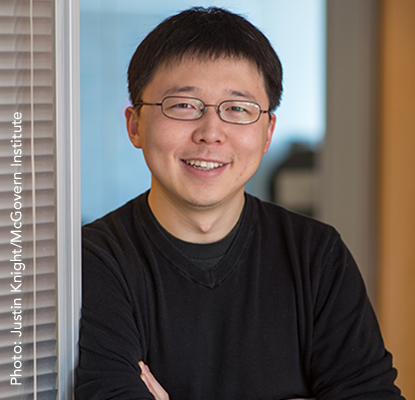Feng Zhang
Feng Zhang was born in China and moved to Iowa with his family when he was eleven years old. Through a supportive school environment, he flourished and became a star student. While at Theodore Roosevelt High School in Des Moines, he won the Pinnacle Award at the Intel International Science and Engineering Fair in 1999, and placed third in the national Intel Science Talent Search a year later.
Zhang studied chemistry and physics at Harvard and graduated with the highest honors. He then headed to Stanford University for his doctoral work, where he joined the newly formed lab of Karl Deisseroth, who had just begun to develop optogenetics as a method for manipulating brain activity. Over the next five years, Zhang played a central role in making optogenetics a reality.
In 2009, after earning a PhD in chemistry, Zhang switched his focus to genome editing. That same year, he received a prestigious three-year Harvard Junior Fellowship, during which he worked in the laboratories of two Harvard Medical School professors, Paola Arlotta and George Church. There, he helped develop a new method of gene editing through the adaptation of TAL effectors (TALEs), sequence-specific DNA-binding proteins found in plant pathogens that alter gene expression in plants.
Zhang joined the MIT faculty in January 2011 and became a core member of the Broad Institute of MIT and Harvard. At MIT, he is also an investigator at the McGovern Institute for Brain Research, the James and Patricia Poitras Professor in Neuroscience, and associate professor in the departments of Brain and Cognitive Sciences and Biological Engineering. Zhang is also a Robertson Investigator of the New York Stem Cell Foundation.
Shortly after arriving at MIT and Broad, Zhang learned about microbial CRISPR-Cas systems and decided to explore their potential for mammalian genome editing. His team was first to harness CRISPR as a tool for genome editing, as described in a landmark paper in Science on January 3, 2013.
Zhang has led the subsequent development of CRISPR as a platform technology for gene editing, and since 2013 has published a series of papers that have rapidly advanced the field. For this and his other significant contributions to the fields of science and invention, he was awarded the 2017 Lemelson-MIT Prize, which recognizes groundbreaking inventions that improve our world.
Zhang believes that collaboration, mentorship, and a sense of community strengthen the scientific enterprise. He’s committed to taking an open approach and enabling the global research community to use CRISPR for a variety of applications. He regularly holds widely attended workshops and welcomes guests from throughout the world and works with a thriving online community of researchers who assist each other with genome-engineering projects. He shares his technologies freely with academic researchers either directly or through the nonprofit organization Addgene, which has sent more than 40,000 samples of Zhang’s CRISPR-related tools to scientists in over 60 countries to be used in their research efforts. The Broad Institute also makes the technologies and tools widely available for commercial research through non-exclusive licensing and for therapeutic use in humans via an "inclusive innovation" licensing model. His lab's tools are used in neuroscience, immunology, clinical medicine, and cancer biology, among other fields.
Feng Zhang also believes in mentorship. His lab’s extraordinary productivity reflects his ability to recruit and motivate highly talented students and postdocs, several of whom have gone on to start their own labs or play key roles in biotech startups. He also shares his expertise with young researchers worldwide.
Zhang's experience as a childhood immigrant, combined with his parents' emphasis on humility and improving the world, prompted him to also reach out to K-12 students. He recently joined the board of trustees for the Center for Excellence in Education, a nonprofit that supports student careers in science, technology, engineering, and mathematics (the “STEM” fields). In 2016 he was a keynote speaker at a United Way STEM event, and has been active in its program to bring STEM into middle schools, frequently interacting with middle and high school students who are studying biology.
As a boy, Zhang was compelled to take things apart and see how they work. Even now he still wakes up thinking about how best to solve intriguing problems. He considers the Lemelson-MIT Prize a tremendous honor that reflects his entire team’s efforts to create inventive solutions, as well as the contributions that his parents, mentors, teachers, and colleagues made to his life and work.
Related Articles


